[ad_1]
If you haven’t considered social media marketing for your restaurant, it’s time to seize this excellent opportunity.
Doubtful?
Consider this: according to recent statistics, 63% of consumers use social media to seek out new restaurants or discover new menu items.
By promoting your restaurant on social media, you can heighten brand awareness, attract more customers, and consequently expand your business!
It’s important to remember that establishing an effective social media presence for restaurants requires strategic planning to stand out in the competitive market.
This blog post aims to discuss these essential strategies. Moreover, we’ll guide you in crafting engaging social media posts and highlight the key considerations for marketing your restaurant on these platforms.
Let’s dive right in.
The Importance of Social Media for Restaurants
Social media platforms are no longer merely networking sites. These are now powerful business tools with the potential to turn a local restaurant into a well-recognized brand.
The following section explores social media’s unique benefits to your restaurant, highlighting why it’s more than just a passing trend but a necessity for success in the culinary world.
- Expand your restaurant’s reach and visibility: By tapping into the broad audience on social media platforms, you can effectively extend your restaurant’s exposure and customer base.
- Cultivate interactive dialogue with your customers: Through direct messages, comments, and live chats, you can engage in meaningful conversations with your audience. Consider this: You can address concerns, respond to inquiries, and build personal connections with your audience on social media.
- Drive customer acquisition and growth: As your restaurant gains more social media exposure, it attracts potential customers’ attention. With their interest piqued, they may engage with your online presence, leading them to visit your establishment in person. Over time, this process of discovery and engagement can contribute to a steady increase in customer base and business growth.
- Target residents and tourists effectively: The location-based targeting features of different social media platforms allow you to focus your marketing efforts on locals and tourists in your area. This helps attract not only the local community but also tourists who are looking for nearby dining options.
- Establish trust for long-term customer loyalty: By sharing consistent and engaging social media content like important updates, behind-the-scenes content, and exclusive promotions, you build trust and transparency with your audience, enhancing customer loyalty.
- Transform satisfied customers into brand advocates: When customers have a positive experience at your restaurant, they may use social media as a platform to share their experiences with their friends and followers.
- Boost reviews on food app aggregators: You can use social media to encourage your customers to leave reviews on popular food app aggregators like Uber Eats and Deliveroo.
We know what’s likely on your mind now:
Understanding the significance of social media for restaurants, you’re probably pondering which social networks your restaurant should be present on and why.
Stay with us to find out.
5 Best Networks for Restaurant Social Media Marketing
Each social media platform offers unique advantages for restaurant marketing. To understand how to tailor your strategy for maximum impact, let’s explore five key networks – Facebook, Instagram, Pinterest, YouTube, and TikTok – and uncover the distinct benefits each brings to your restaurant’s marketing efforts.
1. Facebook for Restaurants
Facebook remains a pivotal platform in the social media landscape, particularly with the older generation. Here are compelling reasons for your restaurant to maintain a robust presence on Facebook:
- Expansive user base: With 2.96 billion monthly active users, Facebook offers an immense, diverse audience for your restaurant to tap into.
- Community building: Facebook enables businesses to cultivate communities centered around their brands, fostering customer loyalty and transforming diners into brand advocates.
- Multipurpose platform: Beyond serving as an announcement channel and an information page, your Facebook account can also be your second customer service platform.
- Customer targeting: With the advanced Meta Business Suite, Facebook empowers businesses to target potential customers based on location and interests.
With Facebook’s Detailed Targeting, you can target the exact types of users you seek.
2. Instagram for Restaurants
With its visually-driven format and an ever-increasing user base, Instagram offers an unrivaled platform for restaurants to share high-quality photos of their mouthwatering dishes and captivating ambiance or share Reels that flaunt their restaurant’s ambiance.
Take a look at how restaurants use Instagram to establish their social presence:
- Visual connect: As a highly visual platform, Instagram is ideal for flaunting the visually appealing aspects of your restaurant. From stylish interiors to beautifully plated dishes and enticing beverages, the platform lets you captivate potential diners and entice them to experience your offerings in person.
Consistently showcasing mouthwatering dishes, New York’s Dhamaka restaurant keeps its Instagram feed tantalizingly appealing. | Source
- Local discovery: Instagram’s location and search features enable users to discover restaurants in their local area. By optimizing your profile with your accurate location and relevant hashtags, you boost your chances of showing up in search results, effectively reaching potential customers who are actively seeking dining options near you.
- Influencer collaborations: Instagram is home to a huge network of food, lifestyle, and travel influencers whose followers trust their recommendations. Collaborating with these influencers can create a buzz around your restaurant, helping you to reach new, larger audiences.
- User-generated content: Instagram encourages user-generated content, allowing customers to share their experiences at your restaurant by posting photos, using branded hashtags, and tagging your location. For you, this user-generated content acts as social proof, encouraging potential customers to visit your restaurant.
Transitioning from Instagram’s vibrant photo-sharing community, let’s delve into another visually captivating platform perfect for showcasing your culinary creations: Pinterest.
3. Pinterest for Restaurants
Restaurants can harness the power of Pinterest to showcase their offerings, attract potential customers, and drive traffic to their physical location or site. Let’s delve into why Pinterest should be on your restaurant’s social media checklist:
- Create boards: On Pinterest, you can create categorized boards aligning with various facets of your restaurant. Think along the lines of “Our Signature Recipes,” “Menu Highlights,” “Restaurant Ambiance,” “Seasonal Specials,” and “Cocktail Inspiration.” This feature organizes your content, making it easy for users to navigate and explore what you have to offer.
- Visual content: Like Instagram, Pinterest is an ideal platform to showcase high-quality, visually appealing images of your ambiance, food, and beverages.
- Share recipes and food inspiration: Pinterest is a vibrant platform for pinning delicious recipes, insightful cooking tips, and food inspiration that resonates with your restaurant’s themes or cuisines. This engagement extends beyond just dining at your restaurant and fosters a deeper connection with your brand.
- Showcase special offers and promotions: Highlight your special offers, promotions, or events at your restaurant with Pinterest’s dedicated pins. From holiday-themed offers to limited-time menus and exclusive dining experiences, your pins can feature them all.
4. YouTube for Restaurants
Having a YouTube channel is great if your social media plan entails creating high-quality videos. Here’s a detailed look at why restaurants should use YouTube for social media marketing.
- Storytelling and branding: YouTube serves as a platform where restaurants can communicate their unique story, enhancing their brand identity. With the help of videos, highlight your restaurant’s history, culinary techniques, guiding principles, and the dedicated personnel working behind the scenes.
- Search Engine Optimization (SEO): Being a Google subsidiary, YouTube videos frequently achieve high rankings in search engine results. By optimizing video titles, tags, and descriptions with appropriate keywords, your content’s visibility in search queries related to your location or cuisine improves, leading to an increase in organic traffic to your YouTube channel and website.
- Social media integration: You can easily integrate YouTube videos across multiple social media networks such as Instagram, Twitter, and Facebook. Sharing your video content across platforms increases reach and engagement, enhancing your restaurant’s online presence.
Note: Only create a YouTube channel when you are ready to create a lot of video assets.
From a long-form video content platform to short-form video content, let’s shed some light on why TikTok is great for restaurant social media marketing.
5. TikTok for Restaurants
TikTok is globally popular for short-form video content. For restaurants, this can be an excellent way to create engaging, entertaining videos and to improve the overall digital presence. Since the platform’s user base is predominantly young millennials and Gen-Z’ers, it offers a unique opportunity for your restaurant to connect with a massive audience.
Here’s why we recommend using TikTok for your restaurant:
- Trend and challenges: TikTok thrives on its trends and challenges. Restaurants can boost exposure by incorporating relevant, popular challenges into their videos, tapping into the platform’s widespread popularity.
- Brand visibility: With a user base of over a billion active users monthly, TikTok presents a vast canvas for restaurants to paint their brand story. By producing captivating and inventive content, restaurants can seize this opportunity to amplify their brand visibility and connect with a wider audience.
- Engaging short-form videos: Known for its signature short-form videos, TikTok provides an ideal platform for restaurants to exhibit their food crafting, serving techniques, and enticing ambiance through concise yet compelling videos.
- User-generated content: Encourage your patrons to craft and share their own TikTok videos featuring your restaurant. This form of user-generated content propagates awareness and serves as authentic testimonials, boosting your restaurant’s credibility.
- Influencer collaborations: Teaming with local creators and renowned food influencers can significantly enhance your restaurant’s reach. Their endorsement can attract their followers to your restaurant, expanding your customer base.
Having explored the key social networks that can benefit your restaurant, we will delve into the strategies that can bolster your social media presence.
Here’s what to consider:
6 Social Media Strategies for Restaurants
Ready to spice up your online presence?
Let’s look at six savvy social media strategies that restaurants across the globe are using to supercharge their accounts and captivate their digital audience.
1. Engaging Post Ideas To Entice Your Audience
Designing captivating posts that engage your social media audience is a surefire way to elevate brand awareness and drive business growth.
Ready for some inspiration?
Immerse yourself in these creative post ideas, seamlessly weaving them into your social media strategy for an unforgettable restaurant experience.
a. Behind-The-Scenes Content
Ever wondered why shows about cooking, chefs, and restaurants are so popular?
Simple! It’s all about the allure of witnessing the culinary process!
Engaging post ideas often center around sharing the magic that happens within your restaurant’s kitchen.
For instance, you can create a BTS video of your chef meticulously crafting your signature dish. Ultimately, the aim is to show off your culinary skills to create a deeper connection with your audience.
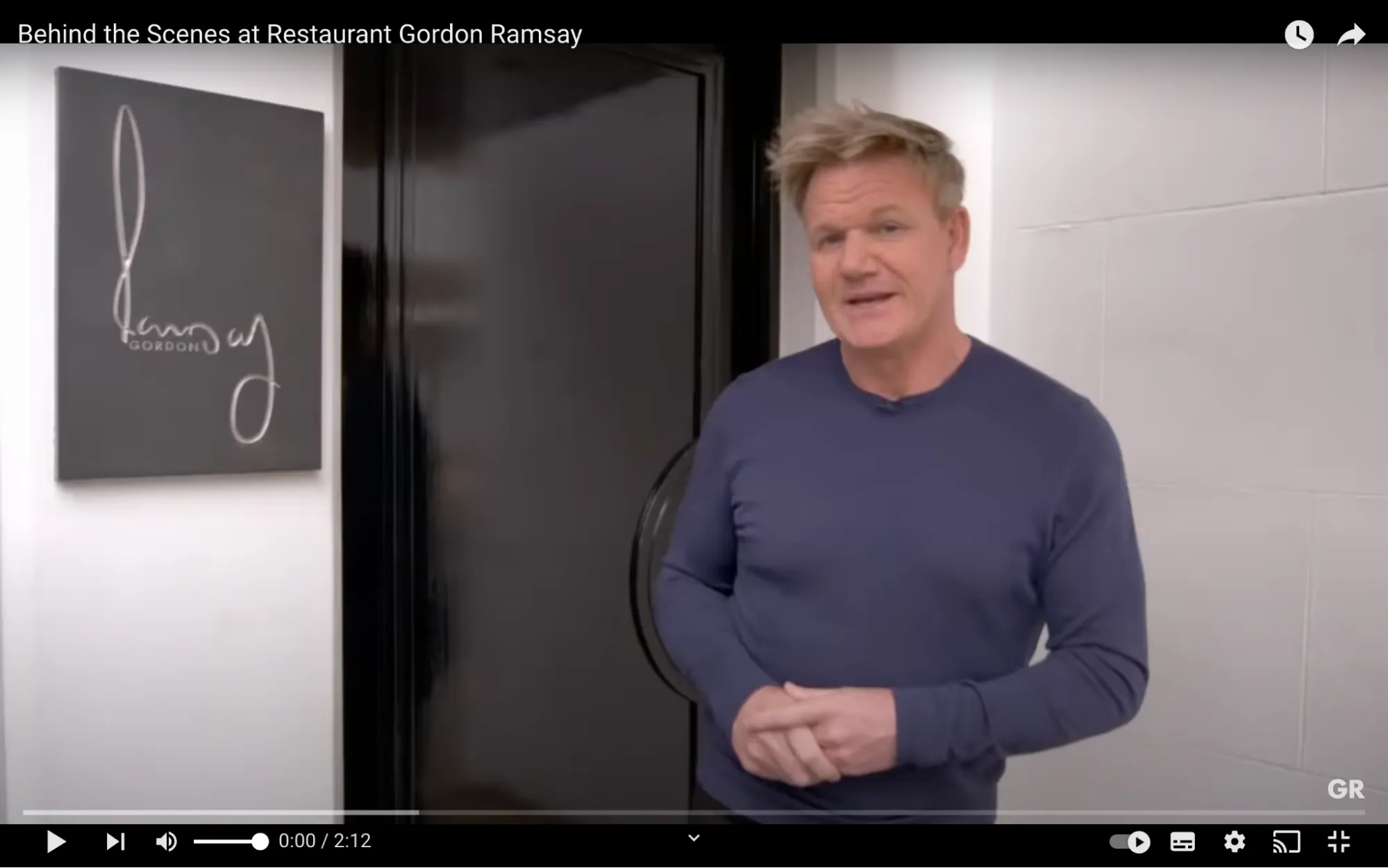
Take a look at this behind-the-scenes YouTube video featuring globally acclaimed chef Gordon Ramsay at his flagship restaurant in London. | Source
b. Host AMA Sessions
Every member of your staff brings unique expertise to the table. Take advantage of this by conducting an AMA (Ask Me Anything) live session through any of your restaurant’s social media profiles.
This is one of the best social media marketing ideas for restaurants, and its benefit is that you’ll understand your audience’s needs and preferences and boost engagement. These sessions are not only compelling to your followers but also to your staff, who feel validated about their work.
When you plan the live stream, inform your followers about the featured staff member (for instance, your beverage director, general manager, or executive chef). During the AMA, this staff member can respond to the audience’s questions in real-time, promoting transparency and interaction.
c. Share Updated Menu Photos
Social media platforms, Instagram, in particular, are perfect for sharing real-time updates with your followers and incentivizing them to dine at your restaurant.
For instance, if you’ve revamped your menu, make it a point to post mouth-watering photos of your newest culinary creations. These visuals can intrigue and entice your followers, inspiring them to indulge in a dining experience or place an order for takeout.
Don’t forget to include a link in your caption, guiding them to an online platform where they can place an order or make a reservation at your restaurant.
d. Create Fun and Engaging Food Videos
Here’s an undeniable fact – viewers are likelier to retain a message conveyed in a video than when expressed in text. Hence, creating fun and engaging food videos is crucial to social media marketing for restaurants.
Given our fast-paced world and dwindling attention spans, ensure that the videos you create are short and stackable.
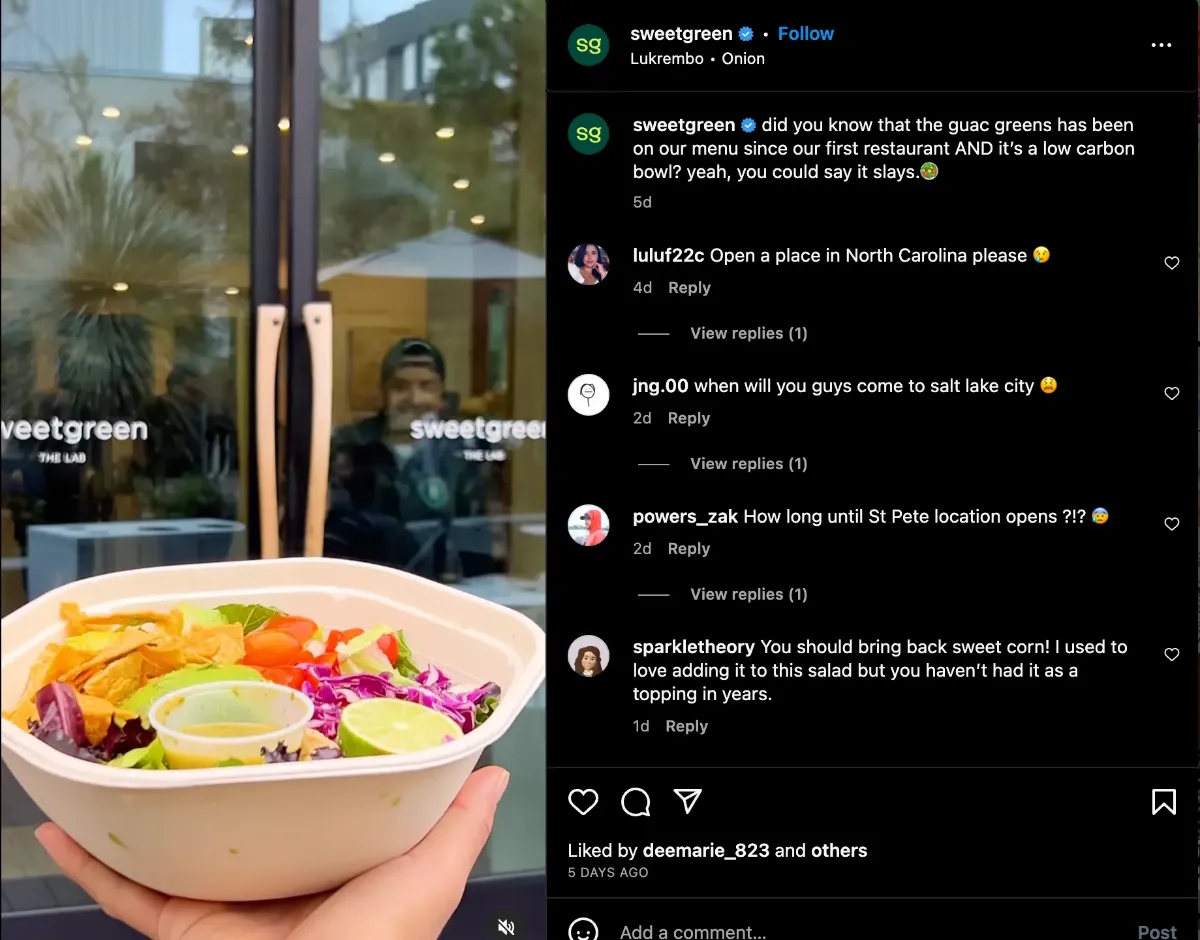
The American fast-casual restaurant chain, sweetgreen, masterfully captured attention on Instagram with its crisp and engaging salad recipe video. | Source
For YouTube specifically, you have the latitude to share in-depth video content. This could encompass exhilarating cooking challenges, detailed recipe tutorials, compelling chef interviews, revealing journeys of sourcing ingredients, exploring seasonal menus, or sharing beneficial tips for healthy eating.
e. Host competitions
Increased engagement on social media is what all businesses strive for.
Why?
Because it’s the stepping stone towards fruitful conversions!
Hosting competitions can serve as one of the best social media marketing tactics for restaurants to boost engagement.
A simple example could be a competition where your followers are invited to create their own unique dish, with the winner having an opportunity to add their creation to your restaurant’s menu. Or something as simple as running a contest asking your followers to caption a photo and give a $50 gift card as a reward.
f. Provide Food Tips and Tricks
Food is essential in our lives, and no one would ever turn down a good food tip or trick. Leveraging your social channels to share valuable tidbits can be an excellent marketing tactic for restaurants.
For example, you might share videos demonstrating different ways to chop onions, tips for efficient food storage, dos and don’ts of microwaving, and so forth. Moreover, you could suggest delightful combinations from your menu or provide guidance on the best methods to reheat your takeout packages.
2. Using Attractive, Customizable Post Templates
Imagine having a suite of customizable templates at your fingertips for crafting visually striking and engaging restaurant social media posts.
Sounds convenient, right?
We have created a collection of stunning templates – these are customizable in Canva and completely free to use!
Once you download these templates, all you need to do is add your logo and make any necessary changes as per your requirements.
Yes, it’s that easy!
Within our collection, you’ll discover templates tailor-made for a variety of social media posts, including today’s specials, special offers, new menu, we’re hiring, and much more!
Download them here to start creating your posts in a snap.
3. Creating a Consistent and Authentic Brand Voice
Imagine this – your LinkedIn portrays a sober, professional image of your brand, while your Twitter feeds are bustling with humorous tweets. Such disparity can confuse your audience and leave them wondering if it’s indeed the same brand. Thus, for an effective social media strategy, maintaining a consistent brand voice is imperative.
But how to ensure a cohesive brand voice across all social channels?
The process isn’t as daunting as it might sound. Here’s what you need to do:
- Develop a style guide that serves as a reference for all team members.
- Stick to a unified color scheme in your post images.
- Ensure the tone of voice in your captions remains consistent.
4. Utilizing Food-Related Hashtags Effectively
Standing out amongst numerous restaurants on social media can be challenging. One of the effective ways to make your restaurant and content visible is by implementing hashtags. This hashtag strategy can help reach audiences that may not ordinarily encounter your posts.
Users frequently browse content through hashtags, especially on Instagram, where they can follow a specific hashtag and view related content directly in their feed. This practice significantly amplifies brand awareness, making it an indispensable component of your restaurant’s social media marketing strategy.
To get started, consider using popular food-related hashtags such as:
#Foodie, #Foodgasm, #FoodLover, #FoodPhotography, #TasteThisNext, and #ForkYeah

Here are a bunch of hashtags related to food and restaurants on Instagram.
Tip: Use hashtags and location tags in your posts to connect with potential customers in your area.
5. Leveraging Location-Based Advertising for Targeting
Location-based advertising stands out as one of the most highly effective tools for social media marketing strategies for restaurants. This strategy empowers you to control the visibility of your ads, often within a specific geographical radius.
Facebook, for instance, allows you to target ads from specified business locations. When a potential customer enters the predefined area and opens Facebook, your ad becomes visible to them. This precise targeting capability can effectively drive foot traffic to your restaurant.
6. Optimal Posting Times for Higher Engagement
Knowing the best times for engagement for social platforms helps you make the most out of your social media marketing.
Don’t you agree?
As per the latest research, the best time is at noon every day for restaurants. Of all the days, Friday stands out as a high-engagement day, likely due to people’s plans to dine out in the evening.
Although these times can serve as a starting point, observing your restaurant’s specific traffic patterns is vital to determine the most effective times to engage your social media followers. Remember, the key to successful social media marketing lies in personalization and responsiveness to your audience’s behavior.
Bonus Tip: This image highlights the elements of a great social media post by restaurants:
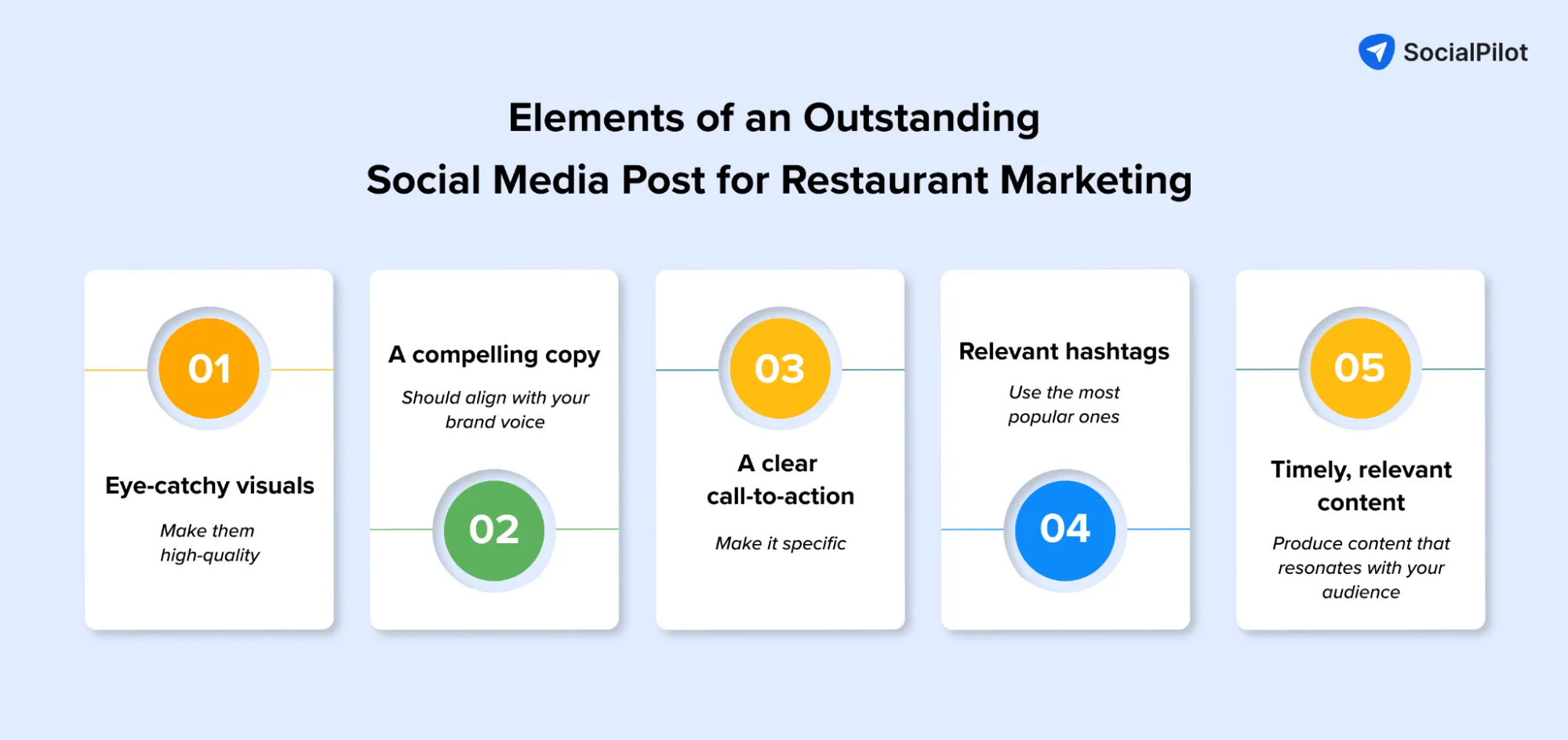
What’s more?
While it’s equally important to know the strategies, there are some essential factors for restaurant social media marketing success that you should know.
Here’s what we mean:
6 Key Elements for Restaurant Social Media Wins
To ensure your restaurant’s social media marketing strategies bear fruit, it’s crucial to grasp the core principles underpinning their success.
Let’s delve into these key considerations.
1. Understanding Your Target Audience
We know that crafting engaging social media content is a cornerstone of effective social media marketing. Yet, before doing that, it’s crucial to immerse yourself in your audience’s world. Uncover their habits, preferences, challenges, and when they frequent different social platforms. This in-depth understanding enables you to tailor content that truly resonates with your target audience.
2. Mastering Photos and Videos for Visual Appeal
You might be familiar with the saying, “We eat with our eyes.” This adage rings especially true in the social media realm, where visually stunning food images reign supreme and often gain immense popularity. Just take a look at this post below!
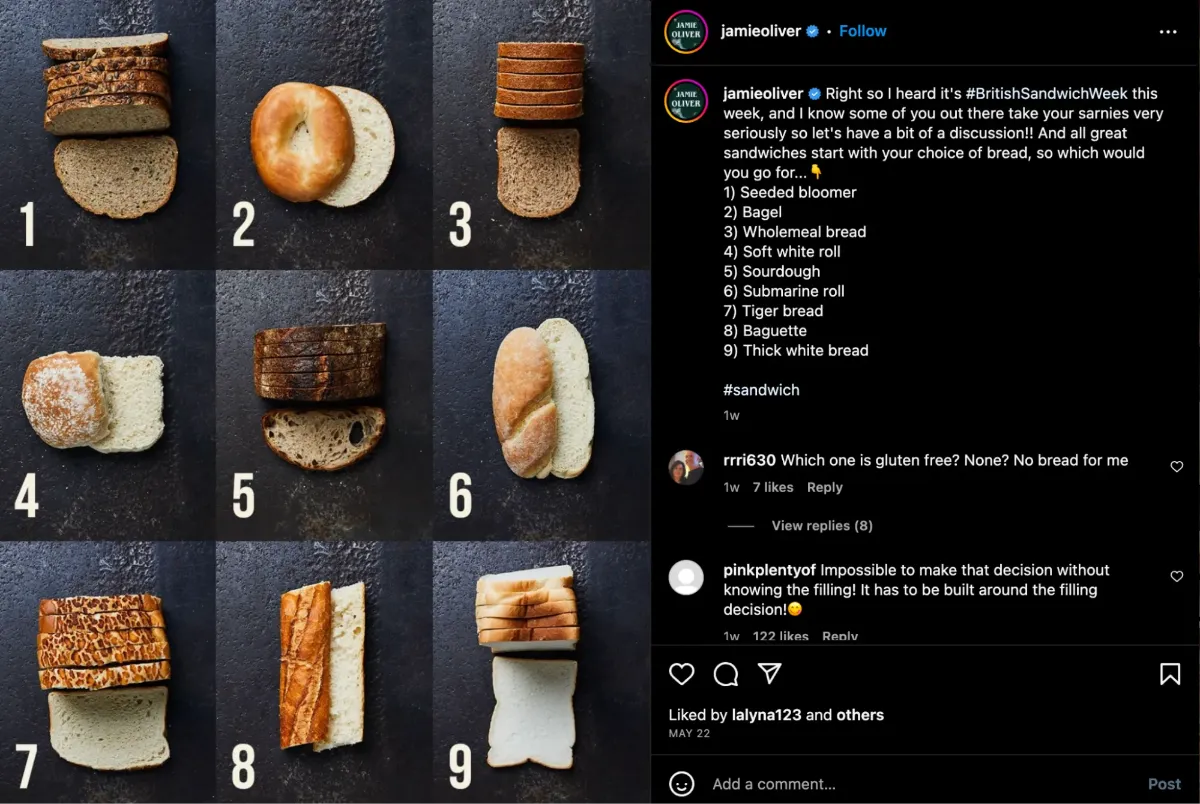
Look at this visually appealing post by Jamie Oliver on the different types of bread during #BritishSandwichWeek | Source
Instagram, notably, is a hub where users adore feasting their eyes on delicious-looking food pictures and videos. In fact, many individuals discover new restaurant recommendations by encountering appealing food imagery in their feeds. Consequently, honing your photo and video skills is a pivotal aspect of social media marketing for restaurants.
Tip: In crafting your visuals, ensure you include your brand’s unique details and colors. Aim for strong, brand-centric visuals to amplify your restaurant’s social media strategy.
3. Participating in Relevant Conversations
Prompt and professional responses to comments, messages, and Story reply on your social posts are pivotal. Such interaction not only leaves a positive impression on your followers but also enhances your brand’s reputation.
Recognize that your fans and followers often use social media to express their concerns. Therefore, swift and empathetic responses demonstrate your commitment to their satisfaction and willingness to resolve any issues that arise.
Brands can improve response rates and keep the conversation flowing with their audience by using SocialPilot, a tool to bring all conversations under one roof!
SocialPilot is an efficient social media management tool offering a simple Social Inbox containing all your conversations, be it your audience’s comments, messages, or Story replies. This allows for easy management, improves response times, and saves a ton of your time.
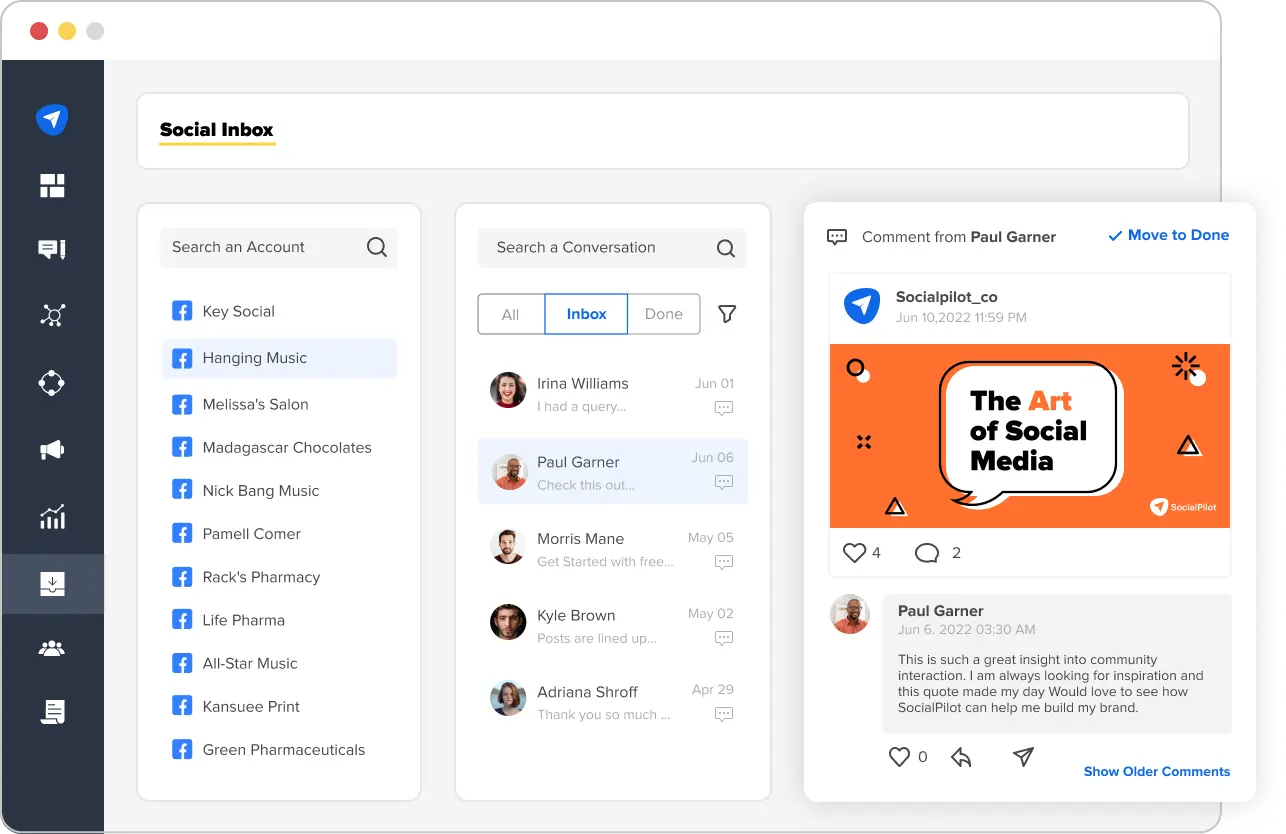
4. Maintaining a Consistent Posting Cadence
For an effective social media presence, maintaining a consistent posting schedule is crucial. Regularly updated content keeps your followers engaged and your brand at the forefront of their minds – a key tactic for expanding a social media account. That said, be mindful not to inundate your followers with excessive posts in a brief period.
5. Measuring and Analyzing Results
What makes measuring and analyzing your social media marketing efforts so essential?
Firstly, it lets you identify which platforms align best with your business objectives. Secondly, it enables you to assess whether you’re effectively drawing more customers to your business through social media. Lastly, it provides an opportunity to reflect on your results and recalibrate your goals, if necessary.
What if we told you there was a way to find and download all the data needed to make the right decisions for your social media strategy?
SocialPilot’s analytics provide a clear picture of your account’s performance and offers insights into your audience with easy-to-read graphs/charts of essential metrics.
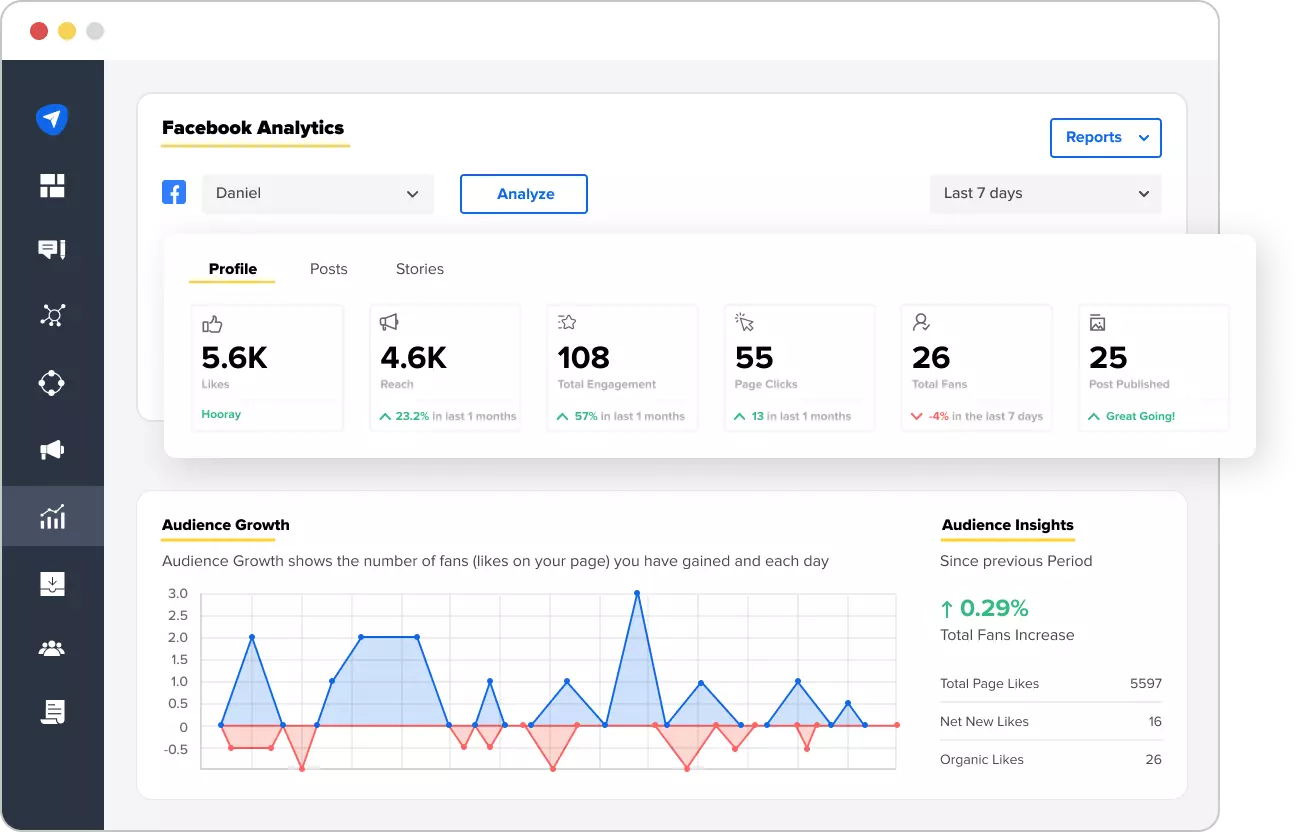
6. Steering Clear of Excessive Posting
It’s a common misconception among businesses that posting more frequently on their social media channels will amplify their visibility. However, it’s important to understand that an inundated feed can fatigue your audience, resulting in diminished engagement per post. Thus, avoiding overloading your followers with content is advisable, as it may lead to annoyance and potential unfollows.
Now…
Having explored the various facets of social media marketing for restaurants, it would also be beneficial to familiarize yourself with top social media tools that can expedite the process of building and maintaining your online presence, wouldn’t it?
Let’s delve in.
6 Social Media Tools for Restaurants
Why use social media tools as a restaurant owner?
These tools help you post visually-appealing photos and videos on your channels and help speed up the entire process of social media management.
Take a look:
1. SocialPilot: Manage Your Social Media Campaigns
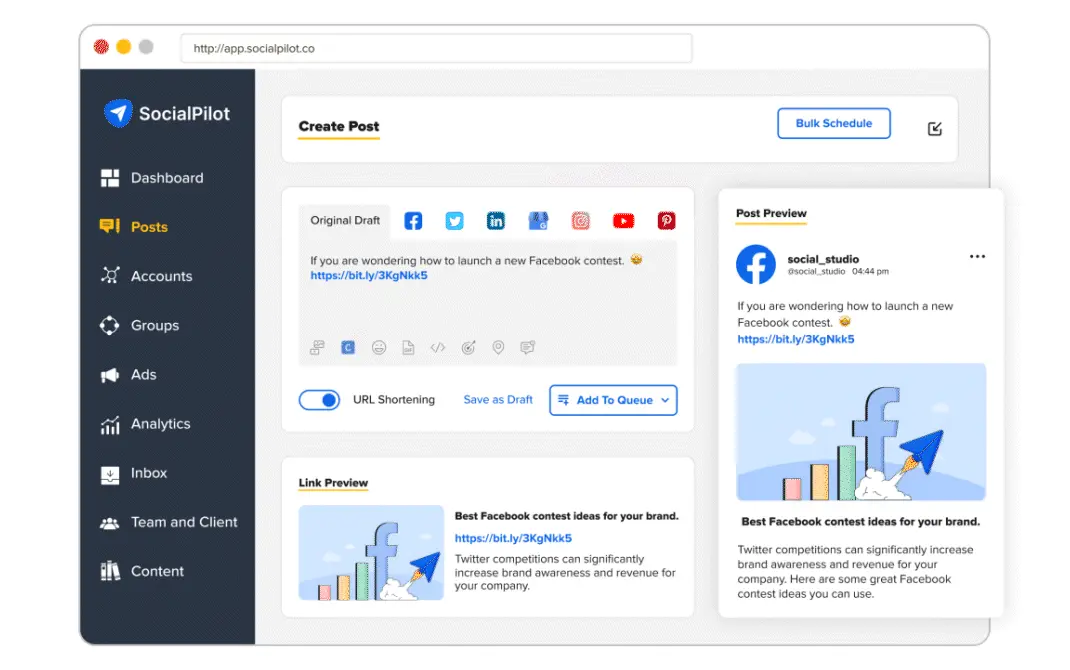
SocialPilot, a robust social media management tool, helps you effectively achieve your social media marketing goals.
How?
SocialPilot offers dynamic scheduling and publishing capabilities, smooth collaboration, and insightful analytics. Moreover, the tool houses a Social Inbox enabling real-time conversations with your audience.
If you’re searching for efficient social media management for restaurants, SocialPilot is a top choice.
Today, SocialPilot is the preferred social media marketing tool for restaurants with a presence on multiple platforms, multi-chain establishments, and marketing agencies managing diverse restaurant accounts.
Let’s delve into the key features that make SocialPilot a frontrunner in the list of robust tools for social media management for restaurants:
- Scheduling and Publishing: This feature allows you to schedule and publish your social media content across all significant social networks, expanding your restaurant’s reach and potentially attracting new customers. The advanced post scheduler offers customization options for each platform, allowing you to incorporate videos, images, emojis, GIFs, mentions, custom fields, and hashtags for a more personalized touch.
- Analytics: SocialPilot provides a comprehensive overview of your social media account’s performance, enabling you to analyze and make necessary adjustments.
- Social Inbox: This tool includes a straightforward and effective Social Inbox, facilitating real-time engagement with your social media audience.
- Collaboration: SocialPilot enhances your team’s efficiency by enabling you to invite team members and clients to collaborate on specific accounts.
2. Canva: Craft Eye-Catching Visual Content
Canva is a simple yet effective image editing tool. Whether adding an artistic filter to a stunning food photograph or resizing an image to fit every social media platform, Canva is your ultimate tool. The best part? You don’t need to be a professional photo editor to make the most of it.
3. Lightroom: Fine-tune Your Photos
Social media marketing for restaurants is revolved majorly around posting photogenic food photos. You can fine-tune and elevate your pictures further with Lightroom. This tool helps manage and refine your images to perfection with filters and color correction to ensure every image you post is striking. Plus, it’s conveniently available both on desktop and mobile.
4. Adobe Spark: Create Stunning Graphics and Videos
Adobe Spark is a great tool for creating share-worthy videos with voiceovers, text overlays, and background music. It also ensures that the final creative piece is in the ideal size and shape for each social network.
5. Unfold: Create Appealing Templates
Unfold, an app available on Android and iOS, helps create stylish templates for Instagram Stories. But its utility isn’t just limited to Instagram. You can use it for Snapchat and Facebook stories as well!
6. Repost: Share User-Generated Content
By now, it should be clear that as a restaurant, you’ll be sharing an abundance of UGC (user-generated content). As its name suggests, the Repost tool assists you in reposting content from other profiles to yours. An added advantage of using this tool is that it retains the original caption and removes any watermarks or tags.
Wrapping It Up
Having covered all the bases, if you implement the social media marketing strategies for restaurants discussed here, you’ll surely catch the eye of a hungry news feed scroller!
The key lies in sharing high-quality, visually captivating images and videos, maintaining a regular posting schedule, and blending different strategies to achieve the best outcomes.
And remember, make use of social media tools to simplify your task of establishing a robust presence on the most appropriate social media platforms.
[ad_2]
Source link









